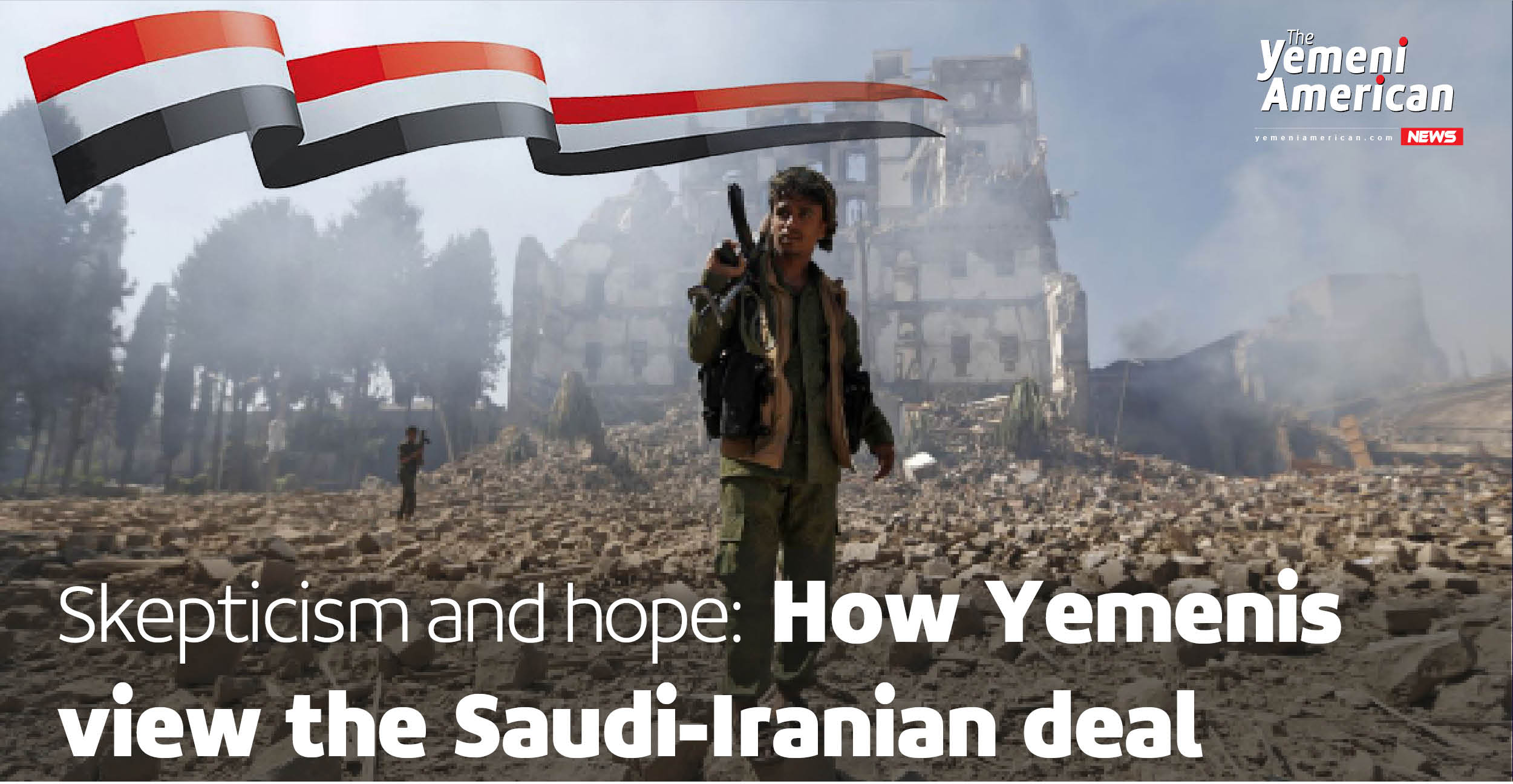The detente between Saudi Arabia and Iran has shocked the world, opening the door for resolving many crises across the Middle East in what can potentially become a major regional realignment.
It is no secret that the rivalry between Riyadh and Tehran has cast its shadow over the conflict in Yemen. And so, many Yemenis have welcomed the Saudi-Iranian agreement, expressing cautious optimism that the pact may help end – or at least ease – the country’s war. But they also emphasized the need for a Yemeni-Yemeni solution.
In their China-brokered agreement in March, Saudi Arabia and Iran agreed to reestablish diplomatic relations and to uphold “the respect for the sovereignty of states and the non-interference in internal affairs of states”.
While details of the pact remain to be seen, Yemenis hope its effects on their country will be positive.
In this article, The Yemeni American News speaks to Yemenis of different political leanings to assess how the country views the agreement.
‘Important step’
Abdel-Bari Taher, a public intellectual and former head of Yemen’s journalists union, said the Saudi-Iranian agreement was a welcomed development and an “important step” to solve the issues in the region, including the conflict in Yemen.
He added that the war in Yemen is “directly related” to regional confrontations, with the United Arab Emirates and Saudi Arabia on one side and Iran on the other. He added that the United States and European countries are also involved with their support for Gulf states and the Saudi-led coalition fighting the Iran-allied Houthi rebels.
But he stressed that the issue is a Yemeni one at the end of the day.
“We cannot deny the roots of the Yemeni problem are between the Houthis and the internationally recognized government and other parties such as the Transitional Council, the Islah party, the General People’s Congress, and the rest of the parties, as they are all involved in this conflict,” he said.
“The entire Yemeni society must participate in finding solutions… And there are other political sides. Civil society organizations, the youth and women – they must participate in finding an internal solution before regional pacts and international agreements.”
Taher also called for talks between the north and the south of Yemen to reach a resolution to the question of southern autonomy.
Still, he said the Iranian-Saudi deal could constitute a push towards a resolution in Yemen if the two countries can pressure the internal sides of the conflict to “reach a political solution and address the catastrophic effects of the war.
“This pact is only a first step towards achieving security and stability in Yemen and the region.”
‘More complicated’
Abdulkarim Ghanem, a researcher in political sociology at the Yemeni Center for Studies and Research, said the Iran-Saudi Arabia agreement did not come as a response to the needs of the Yemeni crisis, but rather to the needs of Tehran and Riyadh.
“It is not among the goals of this agreement to resolve the Yemeni crisis except from one side, as it is a Saudi-Houthi conflict. We can hope that this deal will stop the cross-border war, and on the other hand, the Saudi-UAE coalition’s support for Yemen’s anti-Houthi forces,” Ghanem said.
In Ghanem’s view, the deal between Tehran and Riyadh may ease some of the tensions in Yemen and lead to some temporary relief, but it is unlikely to secure a lasting solution.
“The friendly atmosphere between Saudi Arabia and Iran may contribute to reaching a truce inside Yemen that may last for a year or more. However, this deal will not be able to create peace because the issue in Yemen is too complicated to be resolved by rapprochement between two regional states,” he said.
He said the regional pact may help de-escalate the conflict on two levels – quelling the Houthi threat Saudi territories and ending Saudi support for the internationally recognized government and various armed groups that support the Riyadh-led coalition.
But he said a political solution stemming from the Iranian-Saudi agreement will be difficult to reach, as Tehran is unlikely to pressure the Houthis, while Saudi Arabia is willing to not only put pressure on its allies but change them altogether if necessary.
‘A new era’
Human rights advocate Maeen Al-Abidi said the agreement brought her hope that the regional detente will help end the war in Yemen with the warring sides following the directions of Saudi Arabia and Iran.
“The continuation of the war in Yemen serves foreign interests. Therefore, I hope that this agreement will be good for us, Yemenis, and a start of a political breakthrough, ending the war, and the beginning of a new era,” she said.
Al-Abidi noted that Yemen’s warring sides reached a prisoners’ exchange deal to free nearly 900 people after the Saudi-Iranian pact, calling it a good start to build trust for further agreements.
She said a condition for good results would be for Saudi Arabia and Iran to “agree not to provide any direct or indirect support to the warring Yemeni parties”.
“Then the sides will agree to search for fundamental solutions to the Yemeni crisis.”
‘No one likes the war’
Average Yemeni citizens are keenly following regional developments and their impact on the crisis at home.
Ali, a 34-year-old sanitation worker who supports a family of seven, expressed his joy with this agreement, which he says will benefit Yemenis, including himself and his family.
“No one likes the war in which our salaries stopped and we got tired of this difficult life,” he said.
“We, the working class, hope for this agreement to be with honest intentions – for Yemen to return to stability, for salaries to return, for prices to be reduced, for the value of the riyal to return, and for our affairs to be fixed.”













